There are two things you can absolutely rely on during a typical week in 2019. They are: 1) that some incomprehensible new twist has occurred in Parliament leaving us no closer to a return to normality and 2)Jameela Jamil will have owned the internet yet again, most likely with a single tweet.
The former T4 presenter turned US television superstar is getting extremely good at that. She has taken on Khloe Kardashian and Cardi B (for peddling diet products), Cara Delevingne (whom she criticised for glorifying the ‘problematic’ Karl Lagerfeld after his death) and Piers Morgan(whom she described as a ‘giant pile of wank’ for mocking Sam Smith’s decision to reveal that he identified as non-binary).
Somehow she has managed to come out of these with no legal issues and with even more fans: a modern miracle in itself.
Jameela, 33, who moved to Los Angeles on a whim, with no acting experience, in 2015, and ‘blagged’ a lead role on NBC comedy The Good Place opposite Ted Danson and Kristen Bell in 2016. Since then her social media following has grown to over two million. She uses it to wage a daily fight against body shaming, misogyny and hatred, as well as her I Weigh account, which she describes as a ‘museum of self love’ for its 540,000 followers.
It isn’t an easy job and in an age where we are encouraged to put our phones down, Jameela is often glued to hers for hours on end: making, clarifying and defending points amidst the death and rape threats. It’s a tough job but if someone’s got to do it, it’s Jameela: she’s a thick-skinned woman on a mission.
The latest tweet which ended up making headlines described a recent incident in Los Angeles during which she was approached by a man asking for her number.
Jameela wrote, ‘Was out at the shops with my friend. Man ogles me. Man then approaches me to give me his number. I explain I have a boyfriend but thank him for the offer. Man then threatens my career, saying I better remember that I rejected him. And then Shouts at me that I’m low class.’
In a follow up tweet she added, ‘I once said no thank you to man when I was 19 and didn’t have an excuse... and he punched me in the face. After that whether or not I have a boyfriend, I say I do. Being a woman is truly, constantly scary. It’s like existing on thin ice.’
Thousands of women responded with their own stories which ranged from irritating to terrifying. Now, Jameela tells Grazia exclusively why she is determined to ‘hypernormalise’ this sharing of such experiences, and change the ingrained belief in women that they ‘shouldn’t be causing a fuss’ by doing so.
‘When things like this happen, things that are linked to a much bigger problem, I like to open these discussions on social media. Firstly I think it’s important to hypernormalise sharing and whistleblowing, as we have been encouraged for too long to keep this stuff secret and suffer alone, but also, my doing it encourages other women to come forward about their experiences, which creates a union between us, and it is an extraordinarily powerful way for men to see, in clear numbers, and in graphic detail, how many of us are subjected to a living hell at the hands of far too many men,’ Jameela tells Grazia. ‘It always creates an interesting, empathetic and educational dialogue between the genders, and I’ve noticed more and more men on my timeline want to get involved in becoming allies during this discourse.’
One woman replied to Jameela that a man had chased her down the road after she left the gym, adding ‘He'd been waiting for me, said he'd been watching me exercise & he liked how I looked when I bend over, he then demanded my number saying 'I'm going to take you out'. Now I'm anxious to go back in case I see him again.’
Read some of the responses to Jameela's Twitter post here:
Jameela Jamil Sexual Harassment Twitter Responses - Grazia
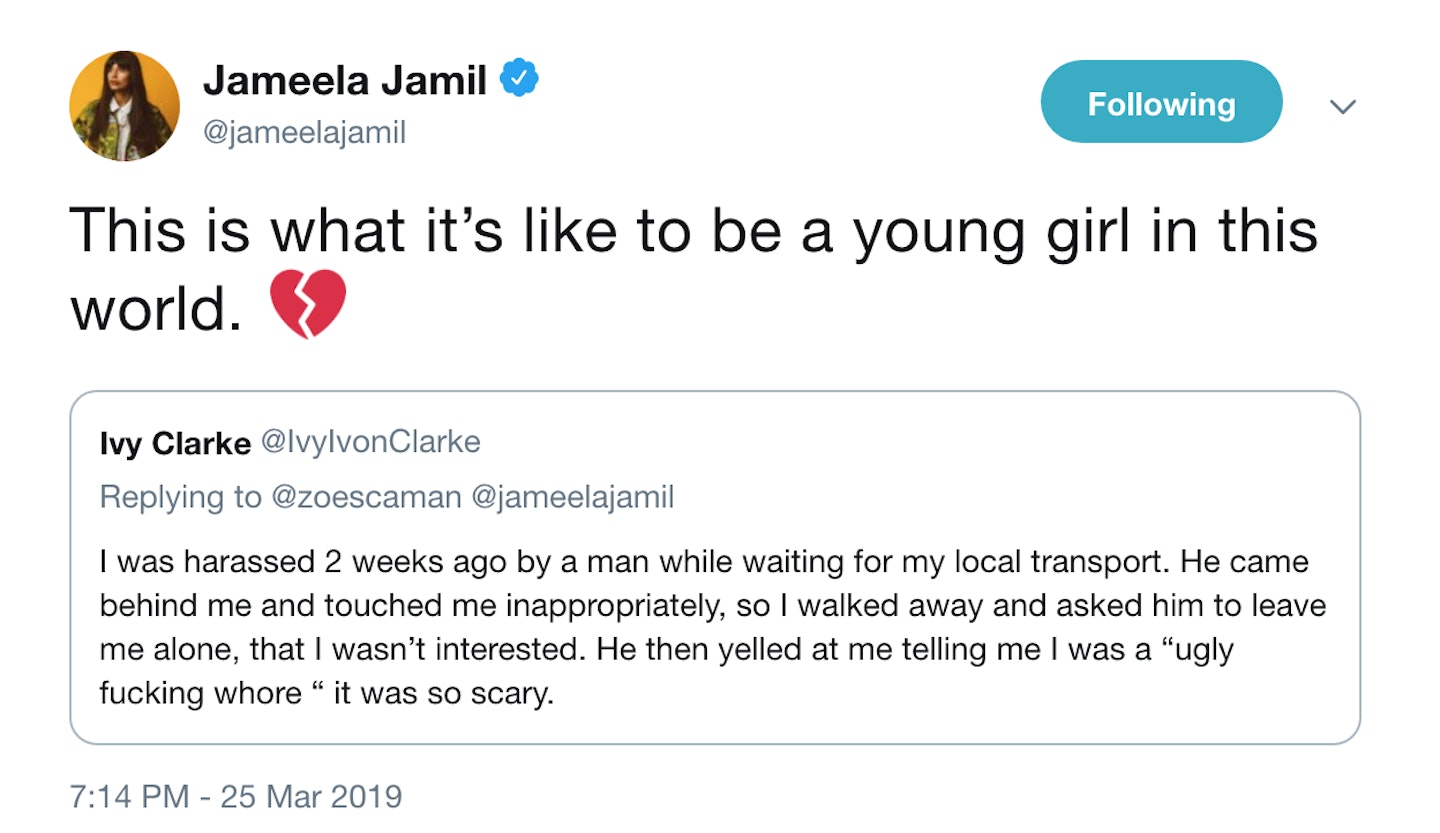 1 of 30
1 of 30Jameela Jamil Sexual Harassment Twitter Responses - Grazia
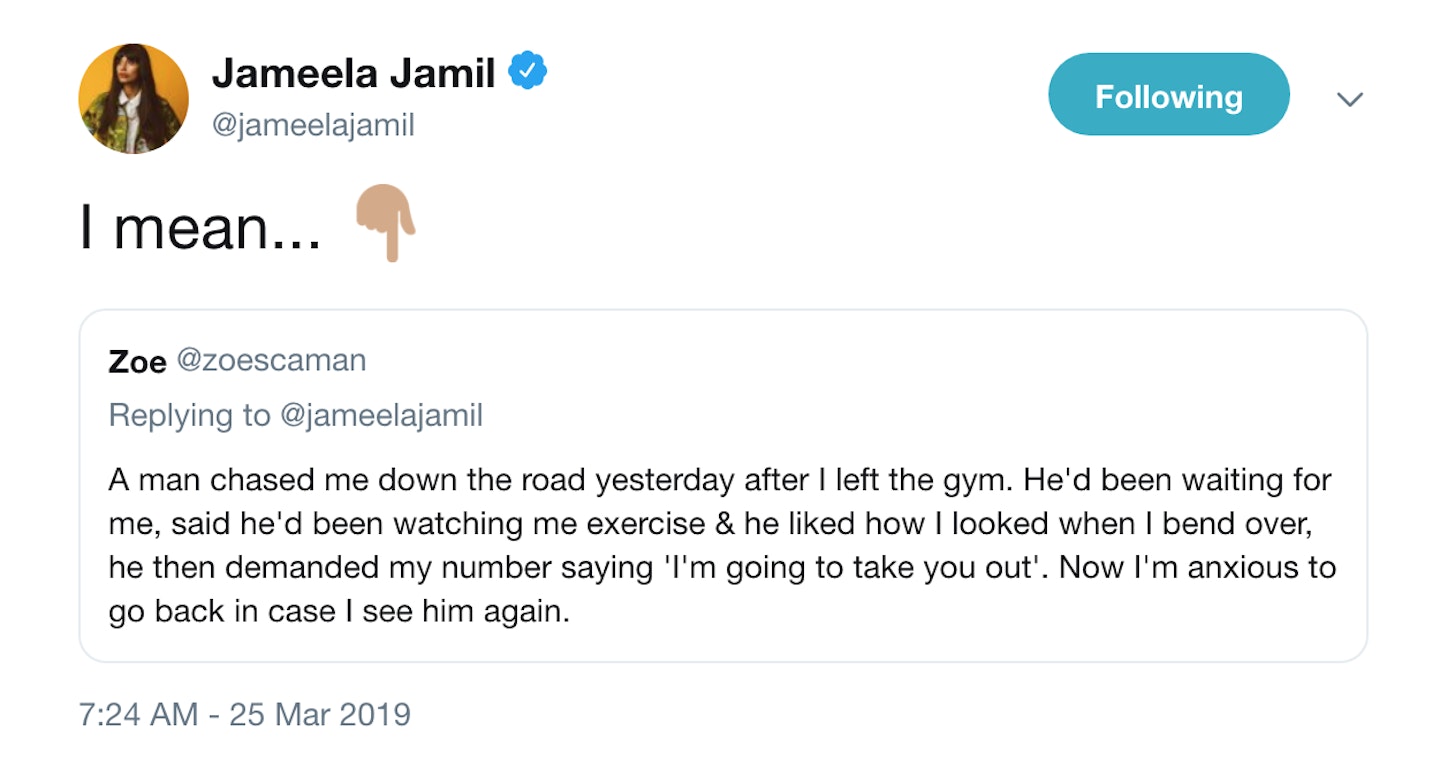 2 of 30
2 of 30Jameela Jamil Sexual Harassment Twitter Responses - Grazia
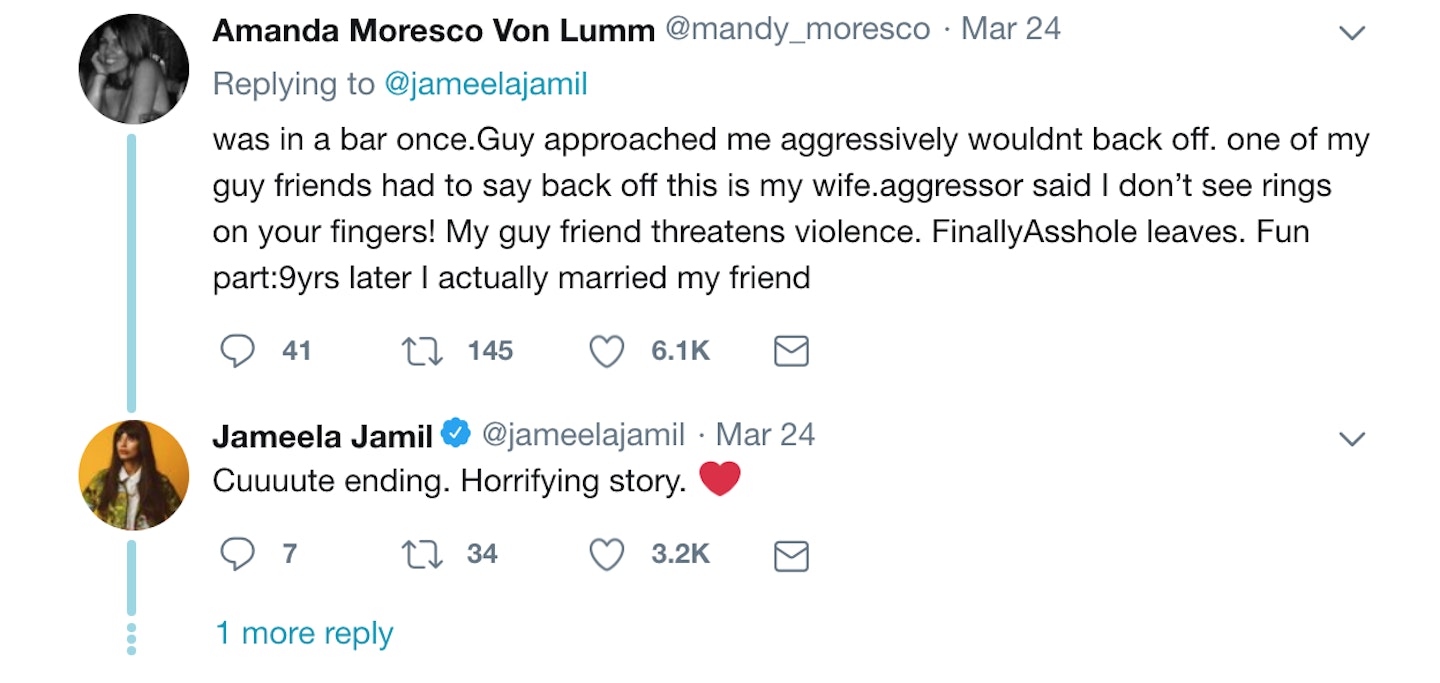 3 of 30
3 of 30Jameela Jamil Sexual Harassment Twitter Responses - Grazia
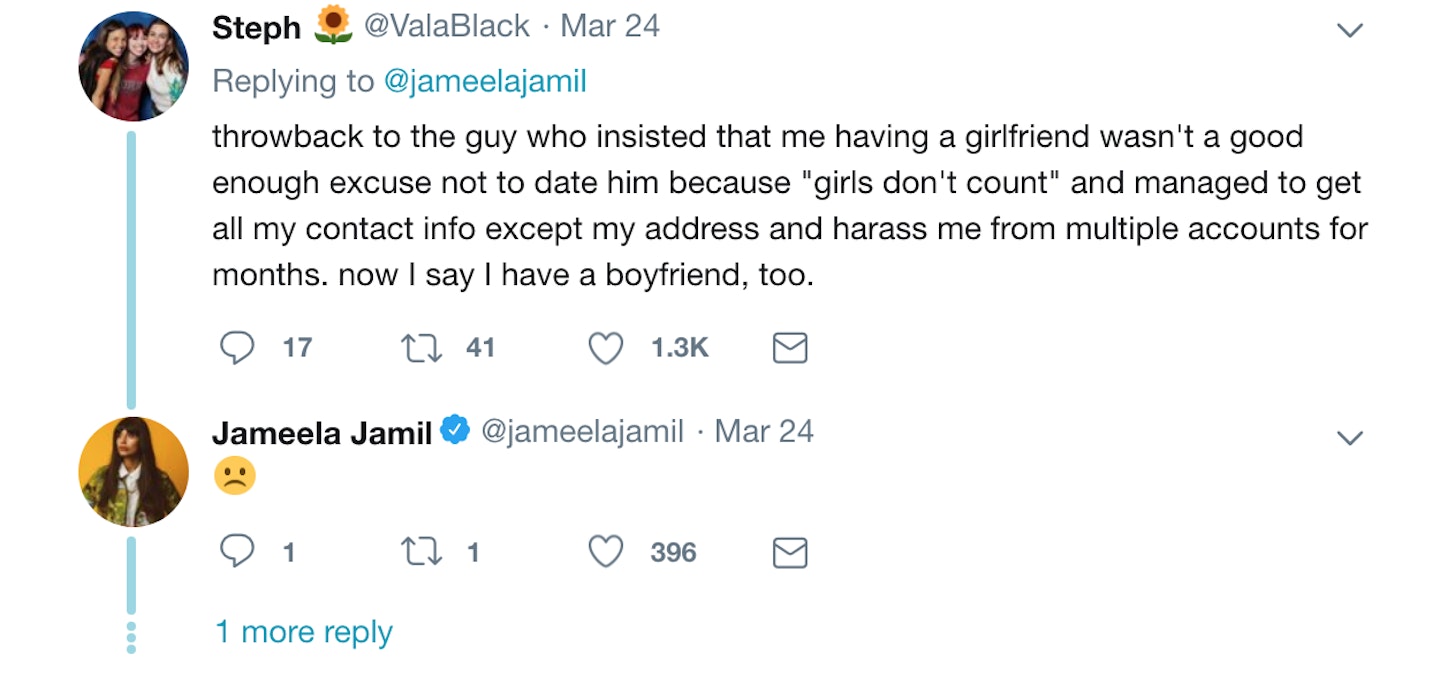 4 of 30
4 of 30Jameela Jamil Sexual Harassment Twitter Responses - Grazia
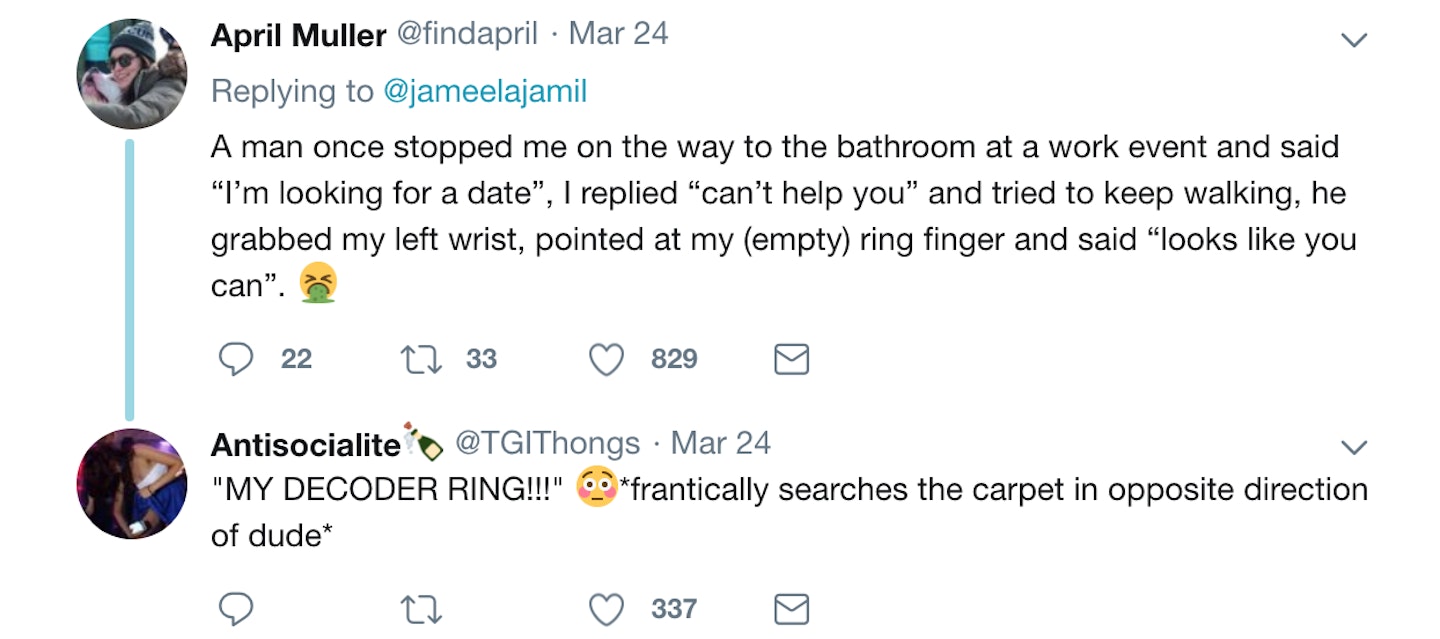 5 of 30
5 of 30Jameela Jamil Sexual Harassment Twitter Responses - Grazia
 6 of 30
6 of 30Jameela Jamil Sexual Harassment Twitter Responses - Grazia
 7 of 30
7 of 30Jameela Jamil Sexual Harassment Twitter Responses - Grazia
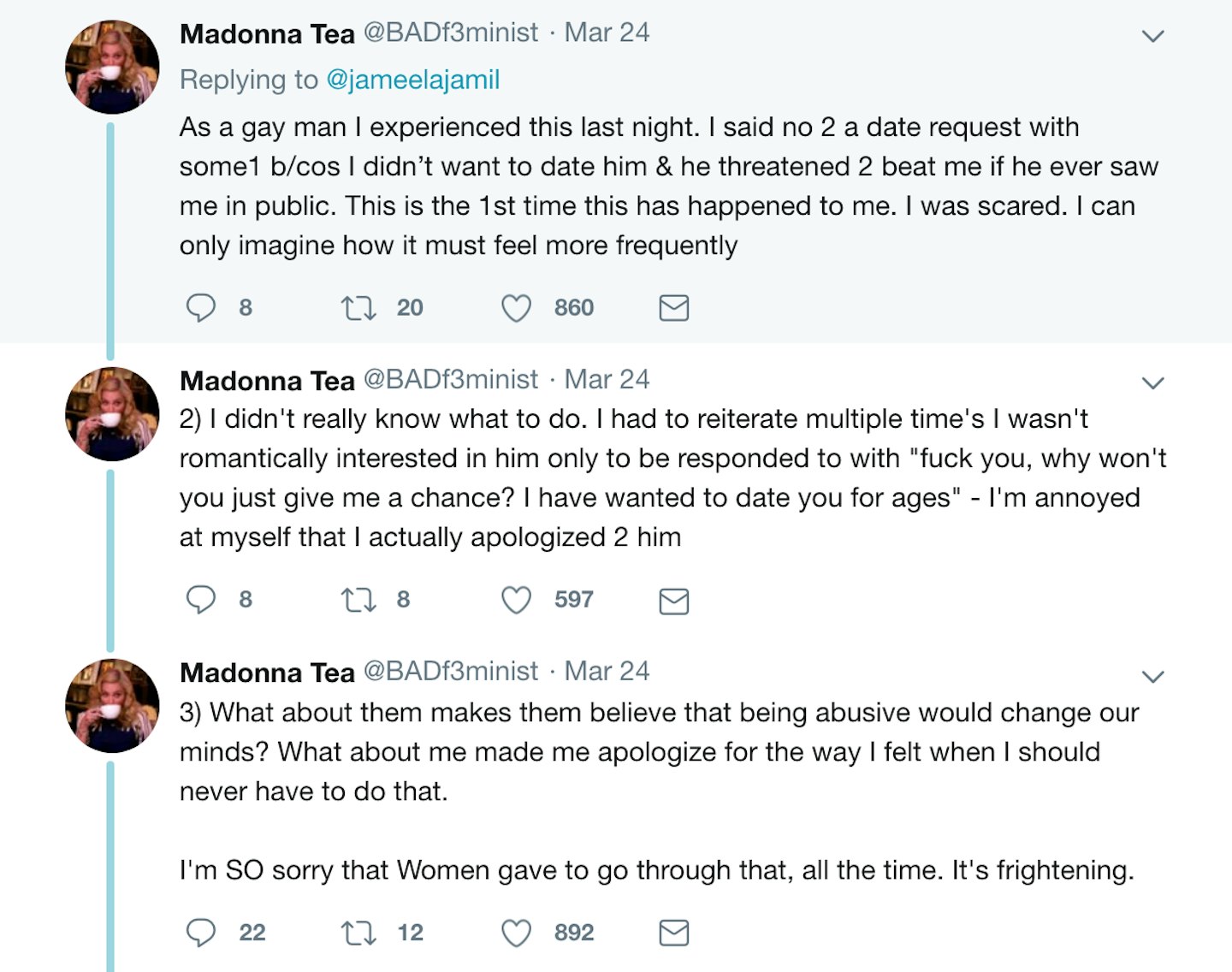 8 of 30
8 of 30Jameela Jamil Sexual Harassment Twitter Responses - Grazia
 9 of 30
9 of 30Jameela Jamil Sexual Harassment Twitter Responses - Grazia
 10 of 30
10 of 30Jameela Jamil Sexual Harassment Twitter Responses - Grazia
 11 of 30
11 of 30Jameela Jamil Sexual Harassment Twitter Responses - Grazia
 12 of 30
12 of 30Jameela Jamil Sexual Harassment Twitter Responses - Grazia
 13 of 30
13 of 30Jameela Jamil Sexual Harassment Twitter Responses - Grazia
 14 of 30
14 of 30Jameela Jamil Sexual Harassment Twitter Responses - Grazia
 15 of 30
15 of 30Jameela Jamil Sexual Harassment Twitter Responses - Grazia
 16 of 30
16 of 30Jameela Jamil Sexual Harassment Twitter Responses - Grazia
 17 of 30
17 of 30Jameela Jamil Sexual Harassment Twitter Responses - Grazia
 18 of 30
18 of 30Jameela Jamil Sexual Harassment Twitter Responses - Grazia
 19 of 30
19 of 30Jameela Jamil Sexual Harassment Twitter Responses - Grazia
 20 of 30
20 of 30Jameela Jamil Sexual Harassment Twitter Responses - Grazia
 21 of 30
21 of 30Jameela Jamil Sexual Harassment Twitter Responses - Grazia
 22 of 30
22 of 30Jameela Jamil Sexual Harassment Twitter Responses - Grazia
 23 of 30
23 of 30Jameela Jamil Sexual Harassment Twitter Responses - Grazia
 24 of 30
24 of 30Jameela Jamil Sexual Harassment Twitter Responses - Grazia
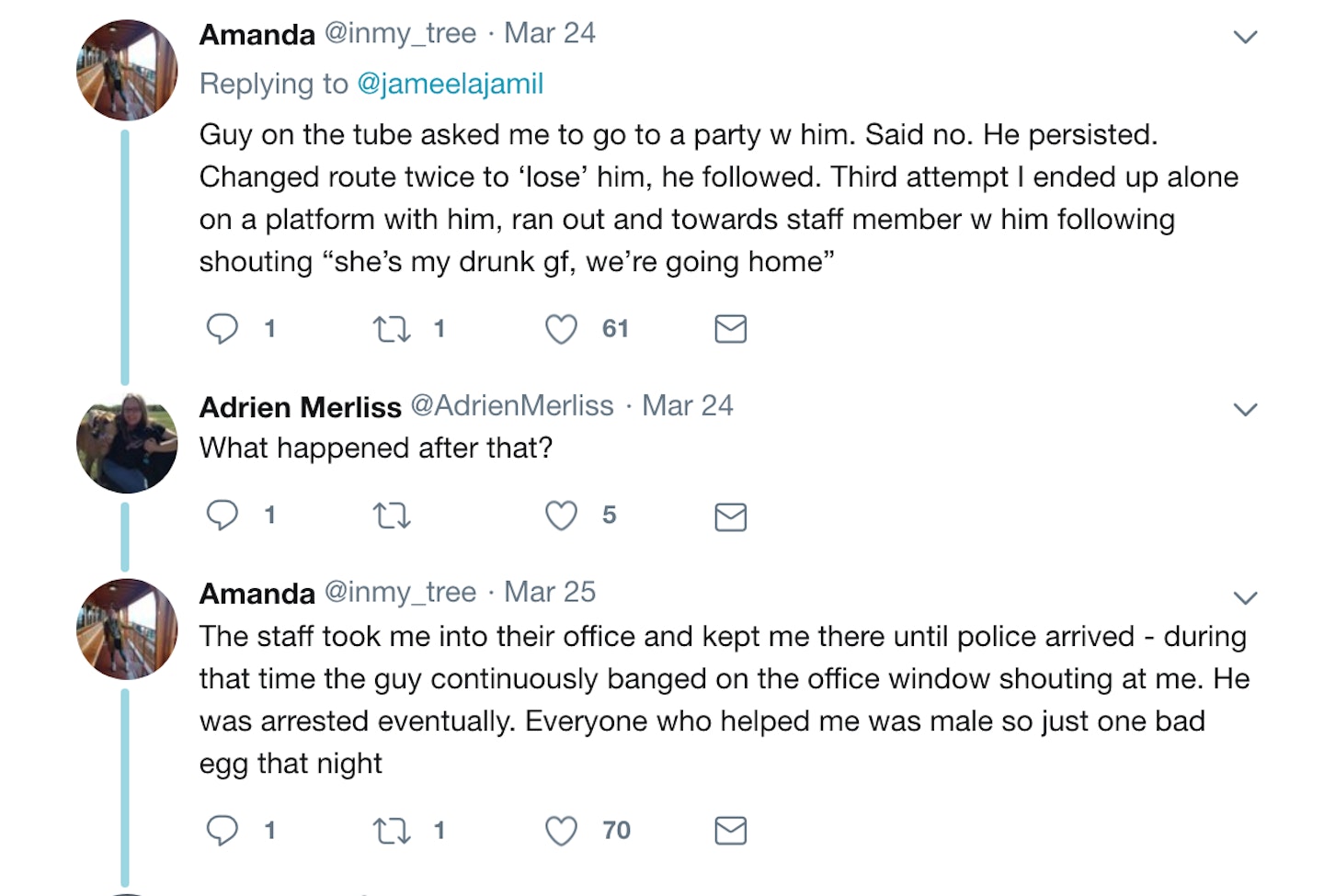 25 of 30
25 of 30Jameela Jamil Sexual Harassment Twitter Responses - Grazia
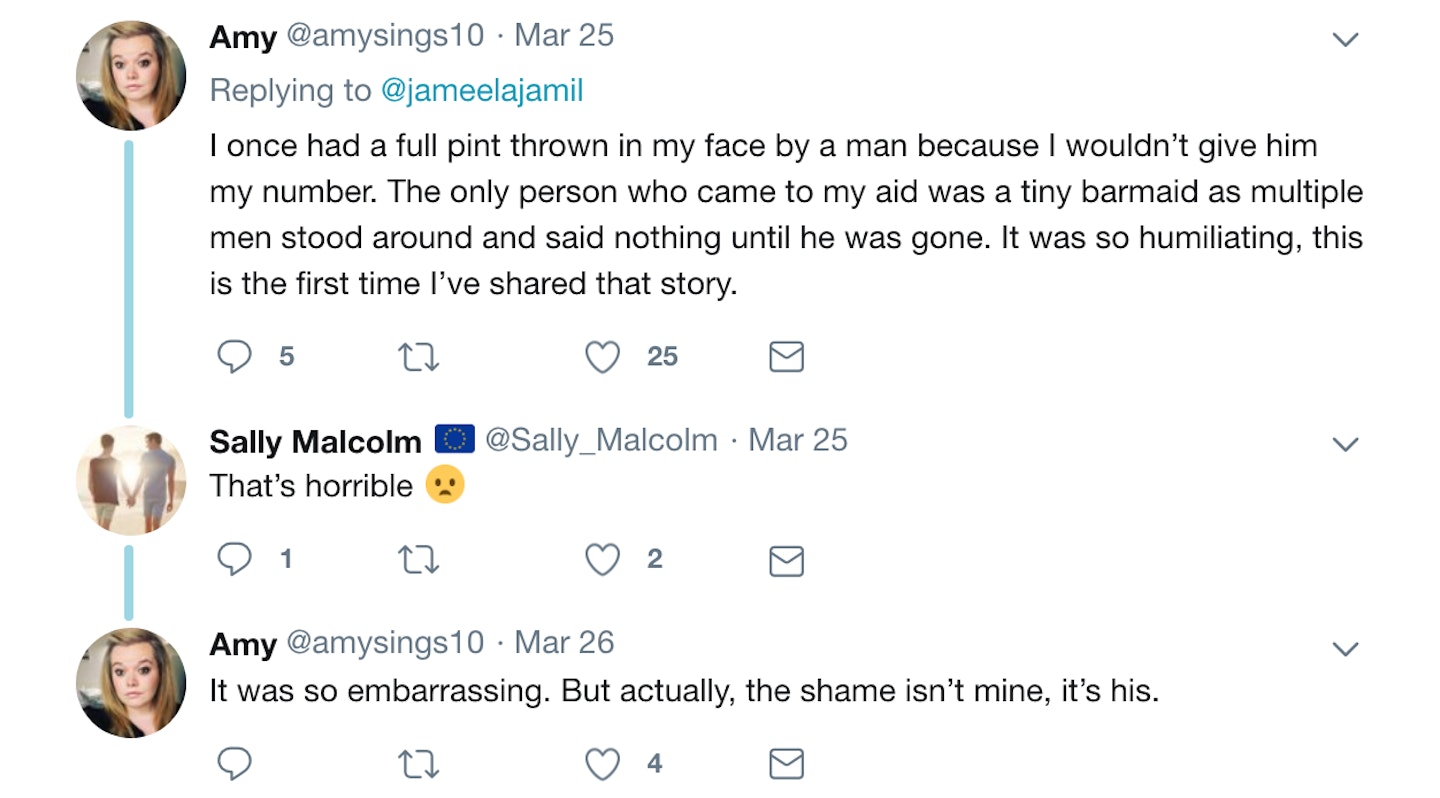 26 of 30
26 of 30Jameela Jamil Sexual Harassment Twitter Responses - Grazia
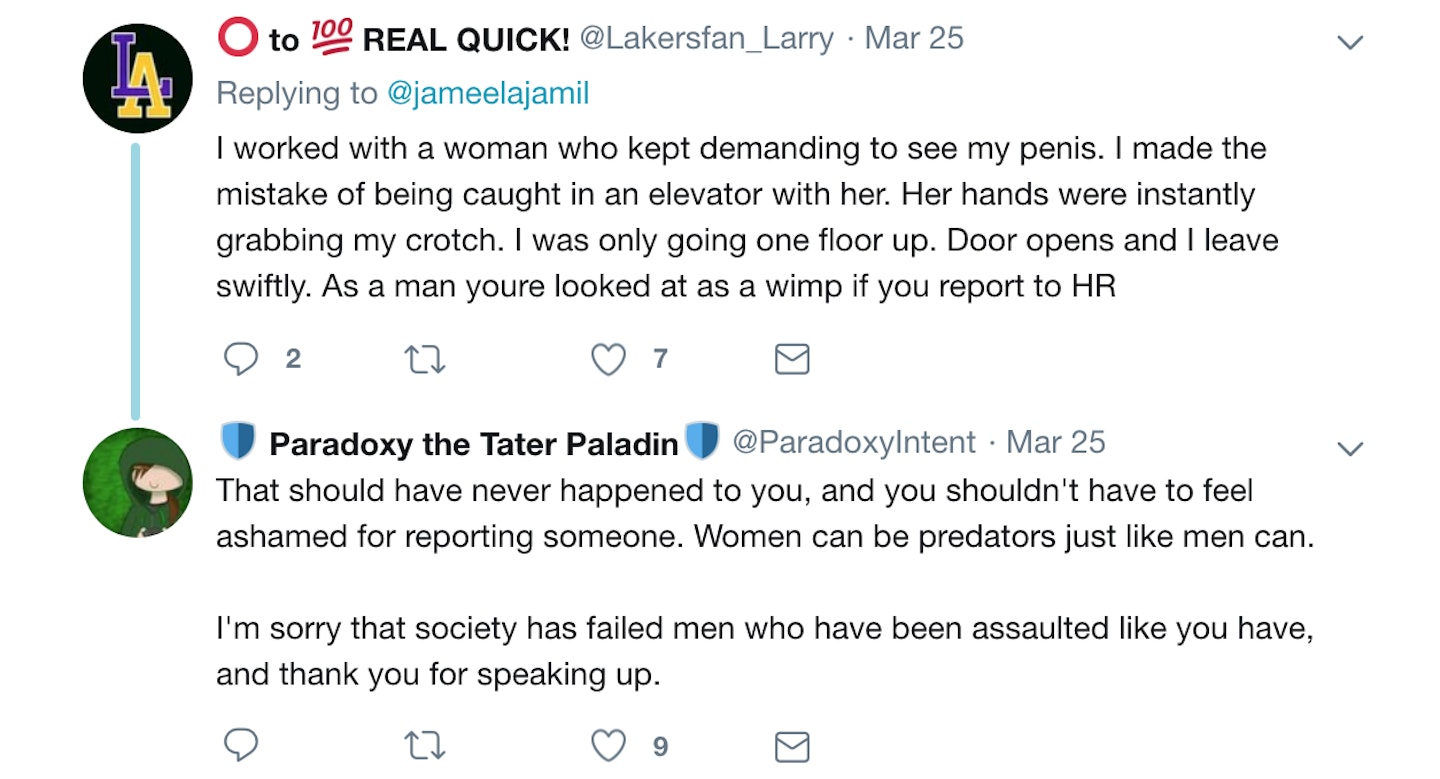 27 of 30
27 of 30Jameela Jamil Sexual Harassment Twitter Responses - Grazia
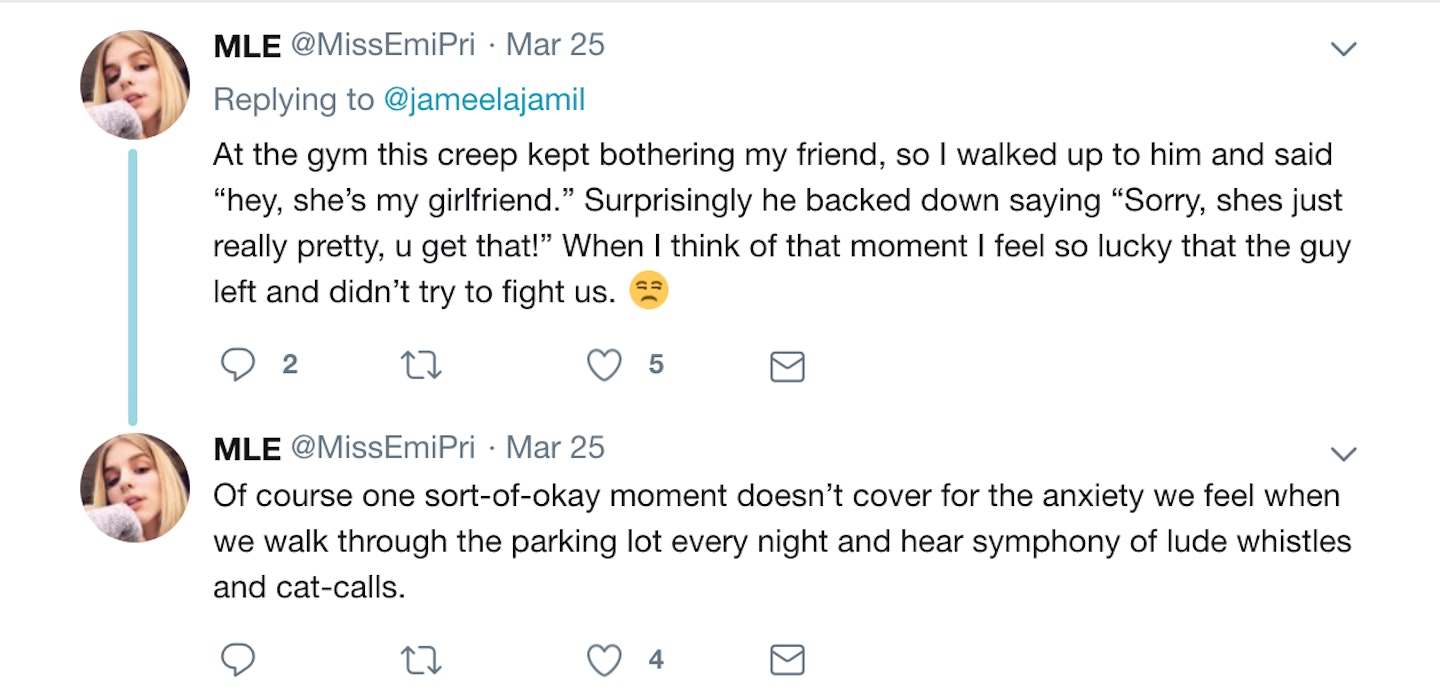 28 of 30
28 of 30Jameela Jamil Sexual Harassment Twitter Responses - Grazia
 29 of 30
29 of 30Jameela Jamil Sexual Harassment Twitter Responses - Grazia
 30 of 30
30 of 30Jameela Jamil Sexual Harassment Twitter Responses - Grazia
Jameela admits that the responses she received were ‘overwhelmingly disturbing’. ‘The things girls go through on a daily basis, how young they are when it starts, the bold aggressiveness of some men, and the reminder that women are still not allowed agency over our own bodies, and we aren’t able to feel safe, anywhere, even in our own homes. Almost especially in our own homes. It’s so important for us to keep speaking out about this, and take it very seriously, and not just dismiss it as “creepy behavior”. It’s dangerous behavior. It’s behavior that gets worse when it is not actively called out and dismantled.’
Incidents in Jameela’s own life have been the driving force for most of her activism: attitudes towards her in the media when she gained five stone (‘five stone of solid gold’, she says) whilst taking steroids for asthma six years ago have spurred her fight against damaging language about weight and size in the media. This latest fight is on an even more overwhelming scale.
‘It’s everywhere. It’s every week of our lives,’ Jameela explains. ‘I was 6 the first time a man showed sexual interest in me, 11 the first time I was groped, I was 12 when a 40 year old man grabbed my vagina on Oxford street in my school uniform at 3.30pm, so hard and for so long, that I bled and had to throw both of us against a wall to get him off. Ten different men in different cities have masturbated at me on public transport. Three different people have ejaculated on my leg as a teenager on my way to school going up the escalator at the tube. I’ve been groped maybe 20 times at rush hour, I’ve been raped. I’ve been followed. I’ve been stalked. I’ve been chased by groups of men I’ve had to outrun to save my life. I’ve been assaulted just for saying no to a man’s phone number. I’ve been blackmailed in business in pursuit of sex. And I deal with constant rape and death threats on social media in my career. And the scariest thing is that, most of my friends have had the same experiences. Mine is not a special circumstance.
Walking anywhere alone as a woman, feels like rolling the dice on your life. Being in a cab is scary. Being alone at home is scary. We are being driven insane. This is too much extra homework for an entire gender. I think women are tired and depressed that this is still going on.’
Exchanges on Twitter such as these are a small start, but they are a start. Jameela explains that she wants the conversation to grow so that both women and men understand both perspectives, and ‘feel galvanized to talk to their sons, friends and colleagues about this behavior towards women. I think men might also feel more inclined to intervene when a man is behaving badly in front of them.’
Talking about rejection is an essential part of sex education, according to Jameela. ‘I discussed this with Jimanekia Eborn on my BBC [Radio 4] documentary about consent. If we teach children how to take rejection, we can de-stigmatize it, and it will make men less volatile when they are turned down. We need to generally just educate everyone about consent. Everyone of every age, because it’s clear that this is somehow still a grey area to us all. Men need to address and deconstruct this idea that women owe them our bodies because they find us attractive. They need to respect the word no, and see it as a red light, not an Amber one. The louder we are together, the more embarrassing and taboo we are going to make this horrendous behavior.
‘Times Up and Me Too have to be kept alive amongst the rest of us. It can’t just be a fashionable statement. Time is still up. And girls are being hurt and bullied for sex every single day still.'
